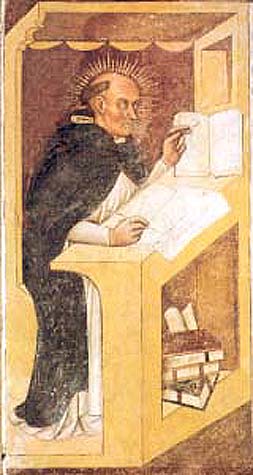|
|
|
Edward Peters
This website is best viewed 1152 x 864 |
Inaugurated
21 January 2010
Updated
22 January 2010
A partial
indulgence is available to those study Christian doctrine (Enchiridion
1999, conc. 6; Ench-iridion 1986, conc. 20; see also
"Blessing of Students and Teach-ers" contained in the Book of
Blessings, Chap. 5 and in the Shorter Book of Blessings,
Chap. 4.) The partial indulgence applies to self-study projects
within any recognized ecclesias-tical discipline, and not just
to cateche-tics. See
1983 CIC 827.2.
Canon Law * Ius Decretalium * Readers Support Page
|
In January 2010, I announced plans to read the Decretals of Gregory IX over the next four and a half years and invited interested persons to consider joining me, and a number of people have expressed interest in doing so. This sort of project is a highly personal undertaking, of course, and most of those attempting it will be carrying out the project in relative isolation. I hope this page can lessen the challenges confronting those engaged in this extended independent study of the Liber Extra. |
To finish reading the Decretals by September 5th, 2014 doing just one column per day, one should now be up to:
Liber I, titulus I, De summa Trinitate et fide catholica. |
|
St. Raymond of Peñafort, op, compiled the Decretals from 1230-1234 |
Using the 928 columns of Friedberg's edition of the Decretals of Gregory as a guide, one could, by reading just one column per day, Mondays though Thursdays, and even taking two weeks off per year, read all of the Decretals in just under 4 years, 8 months. In order to complete, therefore, at this very easy pace, the Decretals of Gregory IX by 5 September 2014 (the 780th anniversary of their promulgation), one should start reading in February 2010.
But, by no means should those who did not begin reading in early 2010 conclude that they cannot join this project! Several aspects of this material can make the reading go more quickly, thereby assisting those who wish to start later but still finish by the Fall of 2014. Most of these aspects are variations on the simple fact that one need not limit oneself to reading only a column per day. Consider:
|
Text options:
-
Aemilius Friedberg, ed., Corpus Iuris Canonici editio Lipsiensis secunda post Aemilii Ludouci Richteri, in 2 vols., Pars Secunda, Decretalium Collectiones, Decretales D. Gregorii P. IX Compilatio (most recently, Lawbook Exchange, 2000) coll. 1-928. There are many, many editions of Friedberg and the columnation is generally consitent from printing to printing. For an general orientation to Decretal studies, see e.g., P. Torquebiau, “Corpus Iuris Canonici”, DDC IV: 610-644, esp. Les Décretales de Grégoire IX, at coll. 627-632.
-
WorldCat Library options for borrowing copies of Friedberg can be found here.
-
Internet Archives Flip-Book here. Note: this is the same version (Bernhardi Tauchnitz) that I am reading in hardcopy.
-
Bibliotheca Augustana has provided an on-line text, arranged by book and title, and including the partes decisae, here.
-
The UCLA on-line edition, with Bernard of Parma's Glossa Ordinaria (but without the partes decisae) is available here.
Some practical suggestions for reading:
-
Work at steady pace, taking time to think, and sometimes even to pray, about what is being studied.
-
This project is something like a marathon, and experienced runners know to avoid starting off at a mad dash pace. Avoid the temptation to read far ahead in the beginning, for such efforts tire most people out and make one less willing to resume the work later.
-
Don't fall too far behind in your schedule, either. Interruptions are inevitable, of course, and should not unduly discourage us, but if one falls far out of the habit of steady reading, it is harder to get back into a routine and makes one feel discouraged at how far "behind" one feels.
-
Set up your reading (whether hard copy or on-line) in one place with your next starting place clearly and consistently marked. Don't waste time and energy having to find your text, or your place in the text, or even a good spot in which to read.
Some Latin resources:
-
My Ecclesiastical Latin webpage (list of grammars, dictionaries, and so on.)
Further background on the Decretals of Gregory:
coming
